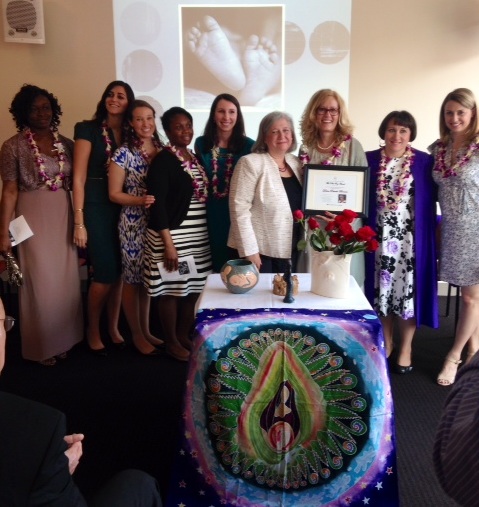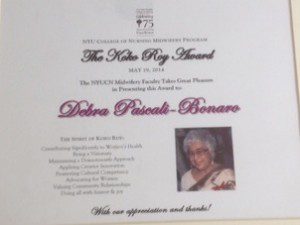This has been a very special week for me. I was honored to keynote the New York University Midwifery Program/College of Nursing Graduation’s Blessingway. Midwives are the gatekeepers of gentle, respectful beginnings and the joy of being able to honor and inspire new midwives as they begin their careers filled me with joy. When Julia Lange Kessler, their Director gave the description of their Koko Roy Award, I was to touched by Koko Roy’s life and dedication to midwifery care. When I learned I received their Koko Roy Award, I was overwhelmed with emotion, my tears, my heart was so full as I feel so blessed to share this sacred path with so many and I am so honored to share with you!

About the Koko Roy Award by Julia Lange Kessler
Background
Asoka Roy was a pioneer nurse-midwife who established this field as a profession in the United States.
She began her midwifery career in India, the country of her birth. One of eleven children, Ms. Roy was born on December 10, 1915, the daughter of a high-ranking civil servant.
Though she could have lived a leisurely life, not needing to work to support herself, she decided, instead, to become a midwife. After learning about deficiencies in maternity care in India, she realized how much mothers, babies and midwives of India needed her commitment to them. From this initial decision, Ms. Roy found that she truly loved the midwifery profession. With great energy, she devoted her entire life to the care of mothers and babies, considering each mother-to-be as a sacred individual on a nine-month journey to deliver a miracle.
Visiting war-torn villages
Her first job was in a hospital in New Delhi and she later became fully trained in midwifery, earning her master’s degree at a university in Calcutta. During the partition between India and Pakistan, she made several trips to the war-torn villages. During this period, stories are told of her courage when she risked her life to see all her midwives to safety and of her trips to the villages to deliver babies — such as twins in the mud-huts of war-torn India — when medical assistance was nowhere to be found.
After the partition, Asoka Roy broke new ground for the cause of Indian nursing, as General Secretary of the Trained Nurses’ Association of India, or TNAI. She was only the second Indian to hold this high-level ‘British’ national post and the first Indian Editor of the Nursing Journal of India.
Then, through her association with TNAI, she traveled to London to earn a midwife’s teaching certificate at the Royal College of Midwives. Before she immigrated to the United States, she was a midwifery tutor in Britain. Ms. Roy always welcomed technology as a valuable complement to the traditional skills she practiced and traveled, also, to Sweden to learn the vacuum-extraction method of delivery.
Trained midwives
Just at a time when American women were beginning to seek midwifery services, Ms. Roy earned her nurse-midwife license in New York in 1967. In 1968, she became the first director of Beth Israel Medical Center’s midwifery program, which was one of the first of its kind. Ms. Roy also taught midwifery students and medical students at the prestigious Yale University. While there, she drafted the curriculum of a course to train foreign midwives for practice in the United States. In 1983, she obtained midwifery-admitting privileges at St. Vincent’s’ Hospital and, when she retired from delivery practice in 1990, the hospital named her “Midwife Emeritus.” During this time, she became a Fellow of the American College of Nurse-Midwives.
Active after her retirement, Ms. Roy attended her last birth, her grand-niece’s, at home, at age 82 in 1998. Until nearly the end of her life, she was involved in developing the Beth Israel midwifery archives.
Throughout her career, Ms. Roy delivered more than 5,500 babies. In a 1983 article in The New York Times, Ms. Roy explained her approach this way: “I consider that the woman delivers the baby, not a midwife or obstetrician.”
Affectionately called ‘Koko” by her friends and family, she died on June 22, 2001 at the age of 85. In her memory, “Koko Roy Award” has been instituted to recognize an individual’s contribution to women’s health. Her story is an inspiration to all Indian nurses and to the global nursing and midwifery community.
Ms. Asoka Roy was one of those fortunate women of pre-independent India, who had access to the highest education and a life of wealth and privilege. Yet, she used her education to devote her life to the care of mothers and babies and toward the improving her profession and inspiring her students and colleagues.
Her New York Times Obituary closes with these words: “Her departure represents a great loss to the international midwifery community. Her spirit will live on for many generations.”
Julia Lange Kessler

Leave a Reply